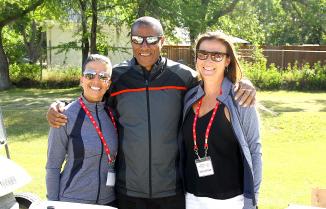For Black History Month, we are celebrating Special Olympics’ Black athletes, volunteers and supporters who fight for inclusion every day on and off the field.
Meet Rod Hill, former NFL player for the Dallas Cowboys, Buffalo Bills, Detroit Lions, and Los Angeles Raiders, as well as Winnipeg Blue Bombers alumni and Honorary Board Member of Special Olympics Manitoba. Read below for a Q&A as he reflects on Black History Month and the importance of diversity.
Q: Is there a black athlete who has inspired you?
A: I have never been externally motivated or can say any particular athlete was an inspiration to me, but I can unequivocally state that my mother and maternal grandmother’s love for me provided all the inspiration I ever needed. However, I have tremendous respect for Major League Baseball’s Jackie Robinson (the first person to break the colour barrier in modern professional sports) and Muhammad Ali (Heavyweight Champion/Civil Rights Activist/Vietnam Objector). These gentlemen would certainly be at the top of any civilized person’s list for the courage they displayed and sacrifices they made to promote equality in not just sports but every aspect of our society.
I also want to recognize someone who I believe deserves a great deal more attention here in Canada, along with Willie O'Ree (the first Black person to play in the National Hockey League) and his name is Herb Trawick, the first African American to play in the Canadian Football League.
Q: Why is diversity and inclusion important in sport?
A: First of all, it is the right thing to do as a society. Sports throughout history has always been the leader for the expansion of diversity/inclusion in education, business, government and every other entity that impacts our daily lives. Competitors want to compete against everyone within our realm to truly measure their athletic prowess. When you limit the competition, it is no longer defined as sports and is now simply playtime.
Q: How do you fight for inclusion?
A: I believe it is paramount for people with differences to intermingle, whether it be in sports, or life in general. The more time people with differences spend with one another the more familiarity and trust can be built. We need to recognize that we have absolutely no control over outcomes, because of the myriad of variables in both competitive sports and our daily lives. We don't have to fight for inclusion when one’s mindset is on competing against self within a process as opposed to winning.
Thank you, Rod!
Stay tuned throughout the month of February as we continue to celebrate Black History Month and highlight Black voices from Special Olympics across Canada.
Support the inclusion movement:


